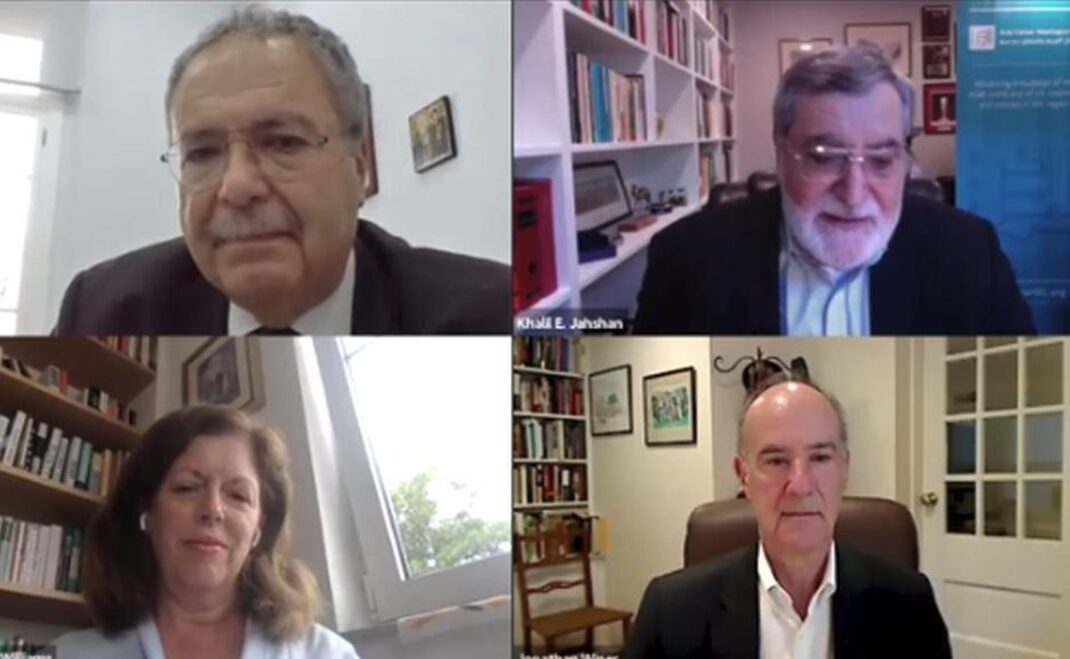
On June 25, 2020, Arab Center Washington DC (ACW) hosted a virtual briefing titled “The Way Forward in Libya: Assessing Regional and International Initiatives.”
ACW Executive Director Khalil E. Jahshan introduced the speakers and moderated the event.
Subject matter experts with extensive diplomatic experience were: (1) Stephanie Williams, Acting Special United Nations Representative in Libya; (2) Tarek Mitri, former Special Representative and Head of the United Nations Support Mission in Libya; and (3) Jonathan Winer, former Special US Envoy for Libya.
Summary of the discussion:
Stephanie Williams explained that the last two months have seen a drastic change on the ground in Libya as forces of the Tripoli-based and UN-supported Government of National Accord (GNA) have pushed those of General Khalifa Haftar to the borders of the coastal city of Sirte.
In effect, these actions ended Haftar’s quest to control the capital, Tripoli. But the resulting calm is not the end of the conflict, Williams asserted, since the conditions remain to rekindle a resumption of strife, especially that both domestic actors and regional and international players still have influence over how the conflict develops.
She cautioned against a possible feeling of victory on the part of the GNA, stating that “there is a risk of triumphalism of overextending the GNA forces and repeating the same mistake, essentially, that Haftar and his forces made on their march into Tripoli in April of last year.”
Williams emphasized the fact that outside actors are complicating things by throwing their support to this or that party. She also reminded the audience of the humanitarian crisis that the conflict has exacerbated: there are now tens of thousands more internally displaced people in Libya.
In addition, she laid blame on Haftar’s forces for planting explosive devices and mines in areas they vacated around Tripoli, which caused the death and injury of at least 100 civilians and GNA troops clearing the ordnance.
Williams lauded the UN Human Rights Council’s (HRC) establishment of a fact-finding mission to investigate human rights violations.
Importantly, she discussed the dreaded partition of Libya along a north-south line and asserted that Libyans are against the idea; however, she added, if current developments continue in the same direction, that may push people toward considering a partition of the country.
Agreeing with Williams about the importance of the HRC’s fact-finding missions in Libya, Tarek Mitri said that the conflict has had the most negative consequences for the civilians in Libya.
He called for a political compromise between Libya’s domestic actors, asserting that the conflict is not caused by tribal hatreds or disputes over borders.
Mitri emphasized, as well, that the strife in Libya is not between a state army and militias since all fighting forces are essentially militias. Further, he underscored the harm foreign actors are causing in the country, stating that “more often than not, Libya is perceived by foreign actors as a battleground and they wage proxy wars.”
Mitri said that Egypt’s declared threat to intervene will not solve any problems; it is largely a strong warning to the GNA not to cross past Sirte. To him, Egypt is trying to regain influence in Libya following Haftar’s defeat in Tripolitania.
Discussing Turkey’s and Russia’s roles in Libya, Mitri said that they might be able to cooperate because a confrontation will not advance anyone’s interests and goals; yet their mutual agreement will not mean the pacification of Libya, either.
No other outside actor has the capacity or the will to play a military role; indeed, to Mitri (as to Williams), it is only a political solution that is possible, and only when Libyan actors decide to unlock the political process.
As for the possibility that a new constitution could be a good way forward, Mitri stated that “all parties are in a constitutional limbo. Their legitimacy has eroded … even among their respective supporters.”
He emphasized the importance of developing good institutions that can guide Libyans in new negotiations instead of working on hammering out power-sharing agreements.
Building on the discussion of outside actors, Jonathan Winer said that they are playing a destructive role and are fundamentally interested in protecting their own interests.
He stated that in 2016, Russia began to support Haftar and actually assisted him in printing money to widen his patronage network. Russia is still helping him militarily, including with mercenaries.
The United Arab Emirates is also heavily involved under the pretext of fighting Islamists who are, to Winer, not what the UAE makes them out to be; i.e., terrorists.
Egypt has a similar approach as the UAE, Winer continued, although Cairo may have some particular concerns; he said that “the Cairo declaration is a series of non-starters and a negotiating tool by the Egyptians.”
As for Turkey, it originally intervened peaceably and with humanitarian assistance, but when American policy in Libya changed and foundered following Trump’s election, Turkey began to assert itself militarily.
At the same time, the UAE and Russia were getting involved by assisting Haftar.
Winer said that the United States under Obama pushed for formulating a political solution to Libya’s problem and building a national army that would be subject to civilian rule.
The Trump Administration, he argued, has no specific policy and the president is not interested in African or Arab affairs, despite the State Department’s long-standing expertise in helping Libya.
Winer concluded his presentation by advocating assistance to local councils and authorities in Libya so they would have autonomy and funding to do what is in the interest of the Libyan people.
***
Moderator
Khalil E. Jahshan – Executive Director, Arab Center Washington DC.
Speakers
Tarek Mitri – Former Special Representative and Head of the United Nations Support Mission in Libya; Scholar and Former Lebanese Government Minister; President, St George University.
Stephanie T. Williams – Acting Special Representative, Head of United Nations Support Mission in Libya; Former US Deputy Chief of Mission in Bahrain, Jordan, and Iraq and former US Chargé d’affaires in Libya
Jonathan Winer – Former US State Department’s Special Envoy for Libya; Former Deputy Assistant Secretary of State for International Law Enforcement
____________




